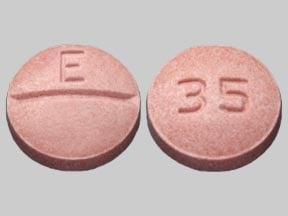
Trandolapril Coupons & Savings Card – Discount Prices from $14.97
Generic for: Mavik
Trandolapril is a prescription medication used to manage high blood pressure, which aids in reducing the risk of strokes, heart attacks, and kidney complications. It is also prescribed to enhance survival and decrease hospitalization chances in individuals with certain types of heart failure following a heart attack. As an angiotensin-converting enzyme (ACE) inhibitor, trandolapril functions by relaxing blood vessels, allowing for smoother blood flow. This action helps to lower blood pressure and reduce the burden on the heart. Typically taken orally once a day, trandolapril is available as a generic option since the brand name Mavik has been discontinued. Common side effects may include a dry cough and dizziness.
Our coupons are free to use. Before paying, show the pharmacist your Trandolapril savings card to get your free discount. Use our filters below to edit the prescription box to match your needs. The Trandolapril prices will update based on your prescription needs. Above our Trandolapril coupons, you can change your location to see pharmacy prices and costs in other areas. We're here to help you buy Trandolapril at the lowest price with our prescription discount card.
My prescription
Edit
1MG, Trandolapril (90 Tablets)
Select pharmacy

CVS
$25.05
COUPON PRICE
Walmart
$14.97
COUPON PRICE
Albertsons
$17.80
COUPON PRICE
Walgreens
$27.72
COUPON PRICETrandolapril savings card
Show this card to your pharmacist
Walmart
$14.97
BIN
ID
PCN
GRP
019876
LHCE7BE697
CHIPPO
LHX
Powered by
Trandolapril is a prescription medication used to manage high blood pressure, which aids in reducing the risk of strokes, heart attacks, and kidney complications. It is also prescribed to enhance survival and decrease hospitalization chances in individuals with certain types of heart failure following a heart attack. As an angiotensin-converting enzyme (ACE) inhibitor, trandolapril functions by relaxing blood vessels, allowing for smoother blood flow. This action helps to lower blood pressure and reduce the burden on the heart. Typically taken orally once a day, trandolapril is available as a generic option since the brand name Mavik has been discontinued. Common side effects may include a dry cough and dizziness.
Our coupons are free to use. Before paying, show the pharmacist your Trandolapril savings card to get your free discount. Use our filters below to edit the prescription box to match your needs. The Trandolapril prices will update based on your prescription needs. Above our Trandolapril coupons, you can change your location to see pharmacy prices and costs in other areas. We're here to help you buy Trandolapril at the lowest price with our prescription discount card.
Related ACE inhibitors prescriptions
coupons from$84.72Save 85%
coupons from$33.05Save 51%
coupons from$18.38Save 60%
coupons from$44.91Save 60%
coupons from$15.56Save 38%
coupons from$7.02Save 81%
coupons from$24.40Save 12%
coupons from$20.94Save 57%
More prescriptions for hypertension
coupons from$3.84Save 91%
coupons from$35.39Save 83%
coupons from$27.32Save 75%
coupons from$5.10Save 80%
coupons from$9.79Save 72%
coupons from$9.79Save 72%
coupons from$2098.39Save 22%
coupons from$7.85Save 93%
Related ACE inhibitors prescriptions
Epaned Save 85%coupons from $84.72
Captopril Save 51%coupons from $33.05
Altace Save 60%coupons from $18.38
Perindopril Save 60%coupons from $44.91
Lotensin Save 38%coupons from $15.56
Accupril Save 81%coupons from $7.02
Fosinopril Save 12%coupons from $24.40
Vasotec Save 57%coupons from $20.94
More prescriptions for hypertension
Lisinopril-hydrochlorothiazide Save 91%coupons from $3.84
Hydralazine Save 83%coupons from $35.39
Accuretic Save 75%coupons from $27.32
Torsemide Save 80%coupons from $5.10
Zestril Save 72%coupons from $9.79
Lisinopril Save 72%coupons from $9.79
Innopran Xl Save 22%coupons from $2098.39
Avalide Save 93%coupons from $7.85
Trandolapril dosage forms
Use our Trandolapril 1MG coupon with prices from $14.97 for 90 Tablets. You can also use our Trandolapril 1MG coupon with prices from $6.66 for 30 Tablets. We have a Trandolapril 1MG coupon with prices from $10.81 for 60 Tablets. You can use our Trandolapril 1MG coupon with prices from $16.36 for 100 Tablets.
Dosage Quantity Price from Per unit 1MG 90 Tablets $14.97 $0.17 1MG 30 Tablets $6.66 $0.22 1MG 60 Tablets $10.81 $0.18 1MG 100 Tablets $16.36 $0.16 2MG 30 Tablets $6.56 $0.22 2MG 60 Tablets $10.63 $0.18 2MG 90 Tablets $21.19 $0.23 2MG 100 Tablets $22.55 $0.23 4MG 30 Tablets $7.63 $0.25 4MG 60 Tablets $12.76 $0.21
| Dosage | Quantity | Price from | Per unit |
|---|---|---|---|
| 1MG | 90 Tablets | $14.97 | $0.17 |
| 1MG | 30 Tablets | $6.66 | $0.22 |
| 1MG | 60 Tablets | $10.81 | $0.18 |
| 1MG | 100 Tablets | $16.36 | $0.16 |
| 2MG | 30 Tablets | $6.56 | $0.22 |
| 2MG | 60 Tablets | $10.63 | $0.18 |
| 2MG | 90 Tablets | $21.19 | $0.23 |
| 2MG | 100 Tablets | $22.55 | $0.23 |
| 4MG | 30 Tablets | $7.63 | $0.25 |
| 4MG | 60 Tablets | $12.76 | $0.21 |
| 4MG | 90 Tablets | $24.40 | $0.27 |
| 4MG | 100 Tablets | $26.11 | $0.26 |
